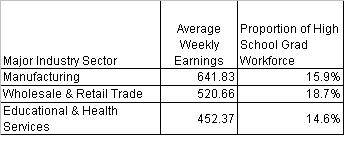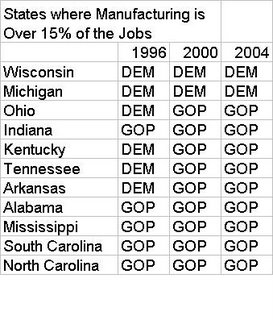Manufacturing - Why We All Should Care
In the May American Prospect, Michael Tomasky talks about the failure of liberals to talk about the “common good,” and instead being relegated to defending the interests of its diverse constituencies. Along his litany of suggestions is for progressives to defend manufacturing jobs—not to be seen as pandering to the interests of its union donors—but because it is related to the nation’s overall good. Anyone who has defended the manufacturing sector has confronted some kind of overt or covert skepticism – like you are nostalgically defending the old economy and going against the tide.
These issues are growing in importance. Manufacturing is at a turning point. Despite an increase of 19,000 jobs in April 2006, manufacturing employment (roughly 1 in 9 jobs in the US) has been left out of the meager jobs recovery of the last two years. While overall employment is up by 3.5% since January 2004, total jobs in the nation’s factories have not budged and employment is still down by 10% since the end of the last recession. The Chicago Federal Reserve Board points out that the current recovery is out of character with past experience. Even in the 1990s jobless recovery, the nation’s manufacturers recovered ahead of the rest of the economy in terms of output and jobs. In contrast, manufacturing output did not recover into 2003, 2 years after the end of the most recent recession.
Why should those of us who don’t work in factories? Is this just a natural transformation of our economy from manufacturing to services, information and finance? Here’s a few reasons:
1) Manufacturing outpaces the rest of the economy in productivity growth. Productivity growth among manufacturers – the amount of output per hour – has averaged 5.67% per year over the past four years, more than 1.5 times overall productivity growth in the rest of the economy. Inequality effects aside, productivity growth is related to the overall prosperity per nation. The more wealth per hour that the nation can produce, the more there is to go around. To the extent that our economy continues to lose productive jobs, our relative prosperity will shrink.
2) Manufacturing has been a source of well paying jobs for Americans with less than a college degree. The hourly wage premium earned by manufacturers compared to other workers has faded away in recent years as the sector has become less unionized and foreign competition has pushed down wages. However, these are still the largest source of decent jobs for lesser educated Americans. The three biggest employing sectors of high school graduates in 2004 were Manufacturing, Retail & Wholesale Trade (think Walmart) & Educational / Health Services (think your local nursing home). Wages in factories allow families to approach something closely to middle class ($35,000 a year) while major service sector industries do not.
Average Weekly Earnings of High School Graduates, Age 18-64, 2004[i]

Finally, there is the piece about politics. Liberals complain how the middle of the country has turned conservative. Clearly some Democrats care about manufacturing jobs. But when the rubber has hit the road – as in the case of NAFTA – Democratic leadership or key individual Democrats have went the way of polices that lead to manufacturing job losses. And its more than just specific policies (which include currency issues, education & training, economic development, employee ownership laws & other layoff aversion strategies, research & development, as well)—it’s image too. I remember watching a 2004 South Carolina senatorial debate between Inez Tennenbaum and Jim Demint, where she was speaking out against devastating trade policies for textile workers. His quick retort was to link her to John Kerry – outwardly changing the subject to social issues but effectively linking her to a national party that has not clearly stood firm on economic issues.
The liberal elite are clearly bi-coastal – and just don’t feel this issue in its gut – the way those of us who are from the Midwest and have seen communities gutted by closed factories do. Most recently, I have been struck by how little media coverage there has been about the potential disastrous effects of auto restructuring on families and communities in the Ohio, Michigan and Indiana. For fun, I decided to match the states with the highest concentration of manufacturing jobs with recent election results. Despite the CW, manufacturing states are no longer blue states. Instead a solid manufacturing policy could tilt the political balance in at least one crucial battle ground state (Ohio) and provide an entrée into making border or Southern states competitive. Such a policy won’t be easy given the changing nature of manufacturing employment – but it is an area where progressives could have an advantage if we spend the time getting it righ.
States with more than 15% Manufacturing Jobs and Recent
Presidential Elections

[i] National Employment Law Project calculations of Current Population Survey Data
These issues are growing in importance. Manufacturing is at a turning point. Despite an increase of 19,000 jobs in April 2006, manufacturing employment (roughly 1 in 9 jobs in the US) has been left out of the meager jobs recovery of the last two years. While overall employment is up by 3.5% since January 2004, total jobs in the nation’s factories have not budged and employment is still down by 10% since the end of the last recession. The Chicago Federal Reserve Board points out that the current recovery is out of character with past experience. Even in the 1990s jobless recovery, the nation’s manufacturers recovered ahead of the rest of the economy in terms of output and jobs. In contrast, manufacturing output did not recover into 2003, 2 years after the end of the most recent recession.
Why should those of us who don’t work in factories? Is this just a natural transformation of our economy from manufacturing to services, information and finance? Here’s a few reasons:
1) Manufacturing outpaces the rest of the economy in productivity growth. Productivity growth among manufacturers – the amount of output per hour – has averaged 5.67% per year over the past four years, more than 1.5 times overall productivity growth in the rest of the economy. Inequality effects aside, productivity growth is related to the overall prosperity per nation. The more wealth per hour that the nation can produce, the more there is to go around. To the extent that our economy continues to lose productive jobs, our relative prosperity will shrink.
2) Manufacturing has been a source of well paying jobs for Americans with less than a college degree. The hourly wage premium earned by manufacturers compared to other workers has faded away in recent years as the sector has become less unionized and foreign competition has pushed down wages. However, these are still the largest source of decent jobs for lesser educated Americans. The three biggest employing sectors of high school graduates in 2004 were Manufacturing, Retail & Wholesale Trade (think Walmart) & Educational / Health Services (think your local nursing home). Wages in factories allow families to approach something closely to middle class ($35,000 a year) while major service sector industries do not.
Average Weekly Earnings of High School Graduates, Age 18-64, 2004[i]

Finally, there is the piece about politics. Liberals complain how the middle of the country has turned conservative. Clearly some Democrats care about manufacturing jobs. But when the rubber has hit the road – as in the case of NAFTA – Democratic leadership or key individual Democrats have went the way of polices that lead to manufacturing job losses. And its more than just specific policies (which include currency issues, education & training, economic development, employee ownership laws & other layoff aversion strategies, research & development, as well)—it’s image too. I remember watching a 2004 South Carolina senatorial debate between Inez Tennenbaum and Jim Demint, where she was speaking out against devastating trade policies for textile workers. His quick retort was to link her to John Kerry – outwardly changing the subject to social issues but effectively linking her to a national party that has not clearly stood firm on economic issues.
The liberal elite are clearly bi-coastal – and just don’t feel this issue in its gut – the way those of us who are from the Midwest and have seen communities gutted by closed factories do. Most recently, I have been struck by how little media coverage there has been about the potential disastrous effects of auto restructuring on families and communities in the Ohio, Michigan and Indiana. For fun, I decided to match the states with the highest concentration of manufacturing jobs with recent election results. Despite the CW, manufacturing states are no longer blue states. Instead a solid manufacturing policy could tilt the political balance in at least one crucial battle ground state (Ohio) and provide an entrée into making border or Southern states competitive. Such a policy won’t be easy given the changing nature of manufacturing employment – but it is an area where progressives could have an advantage if we spend the time getting it righ.
States with more than 15% Manufacturing Jobs and Recent
Presidential Elections

[i] National Employment Law Project calculations of Current Population Survey Data

